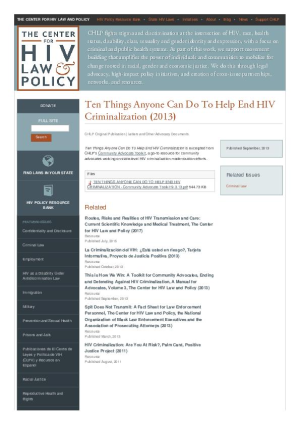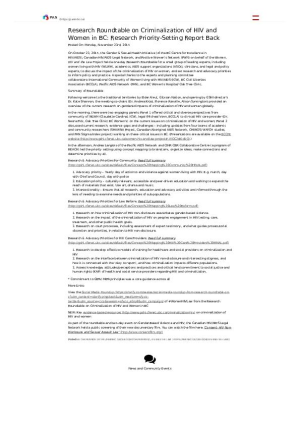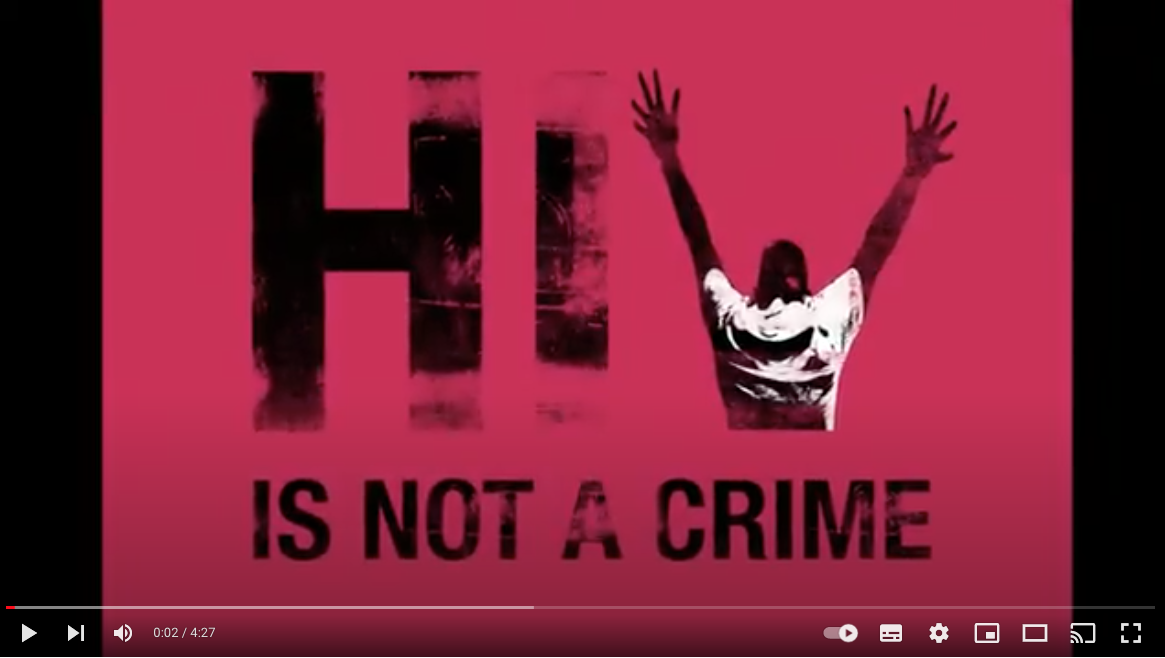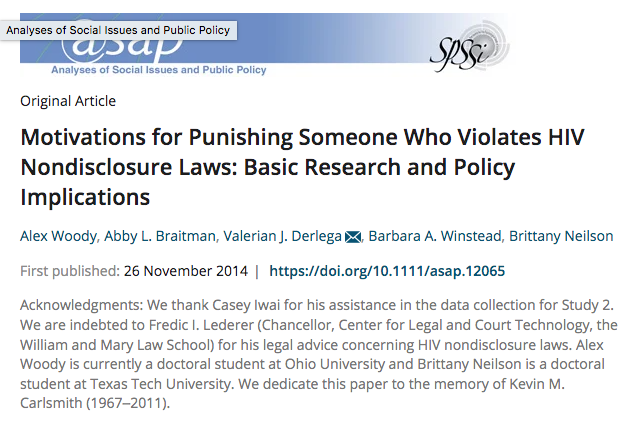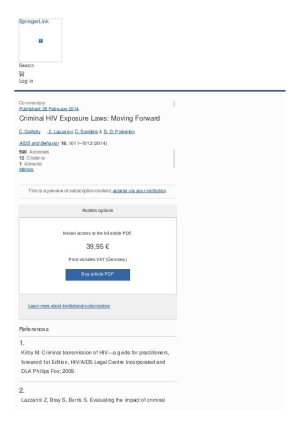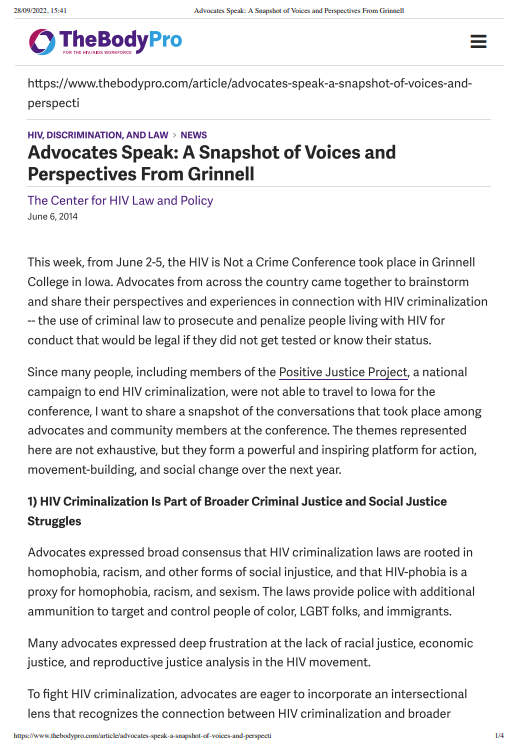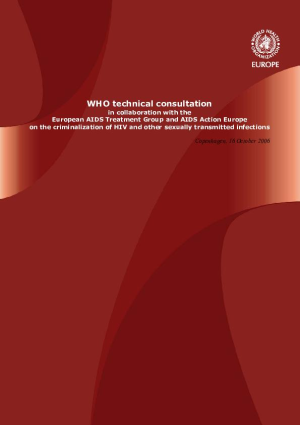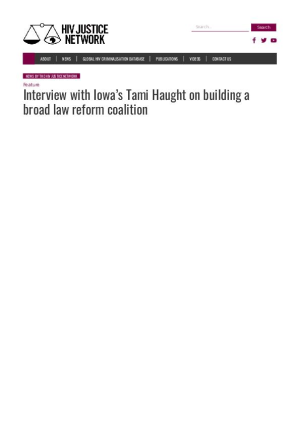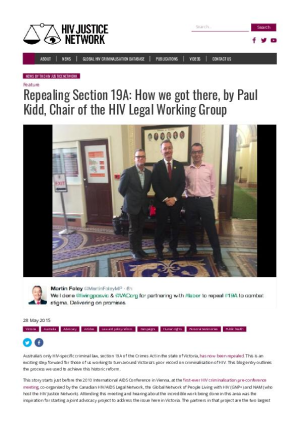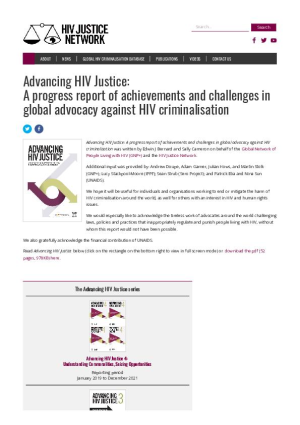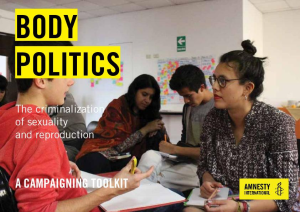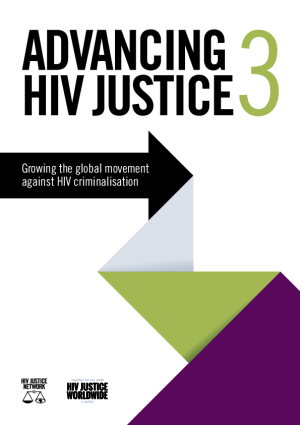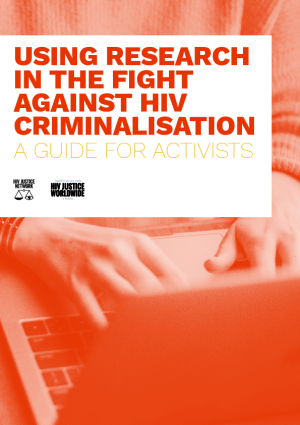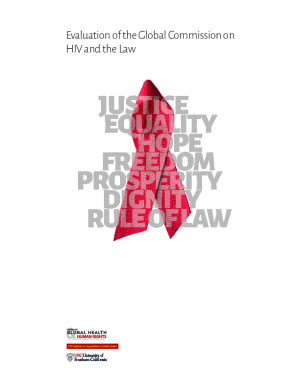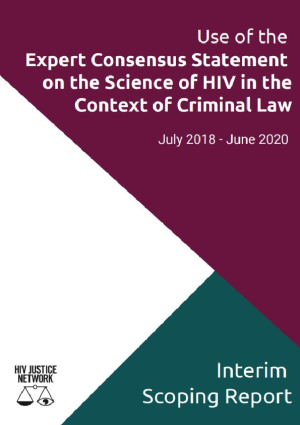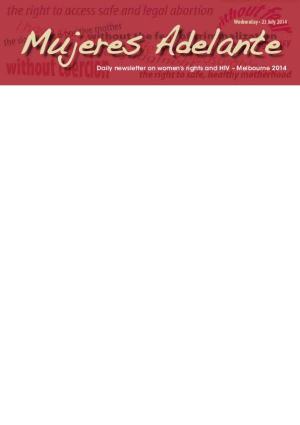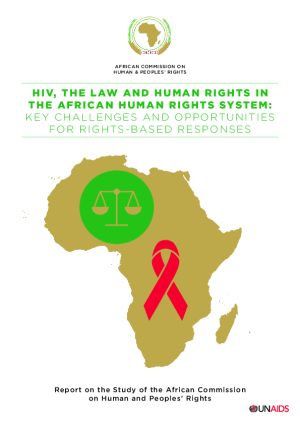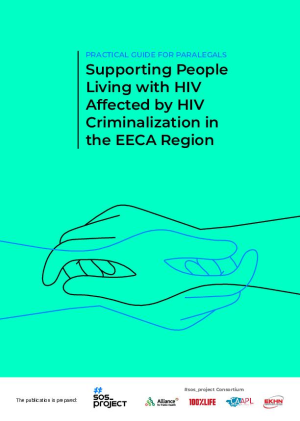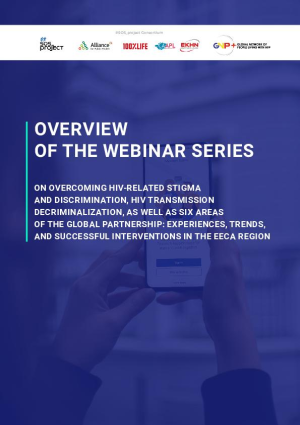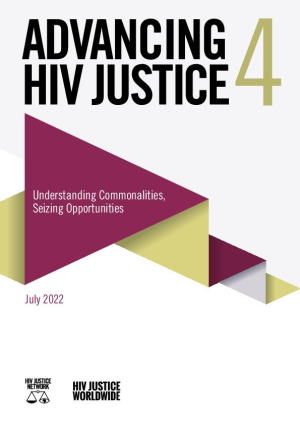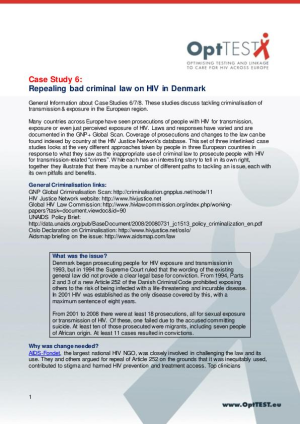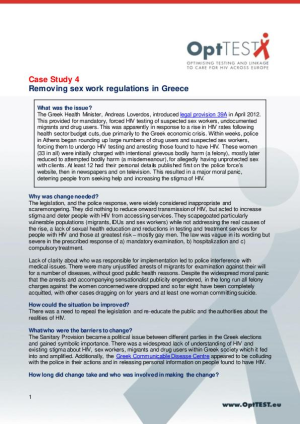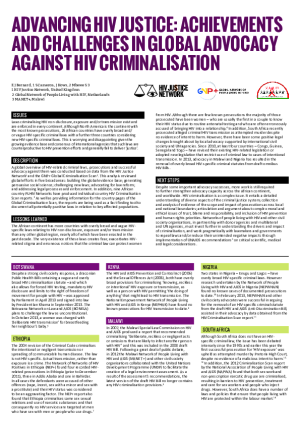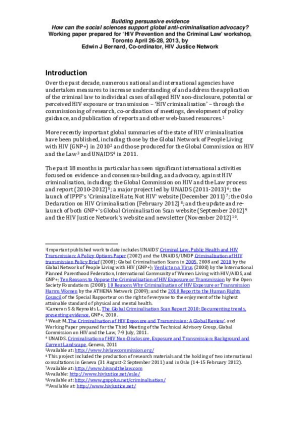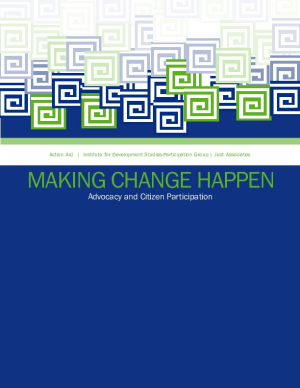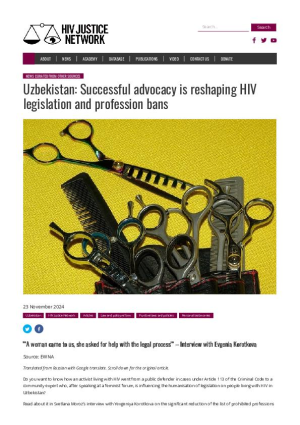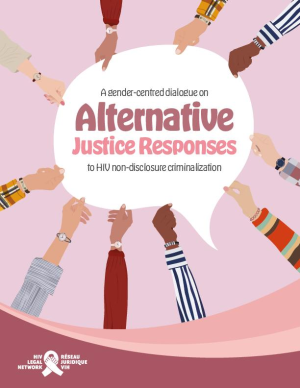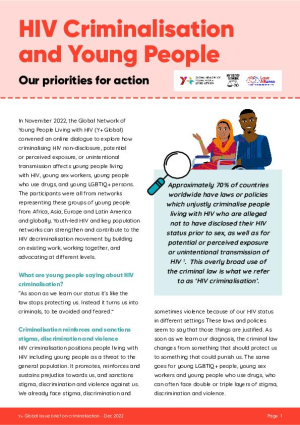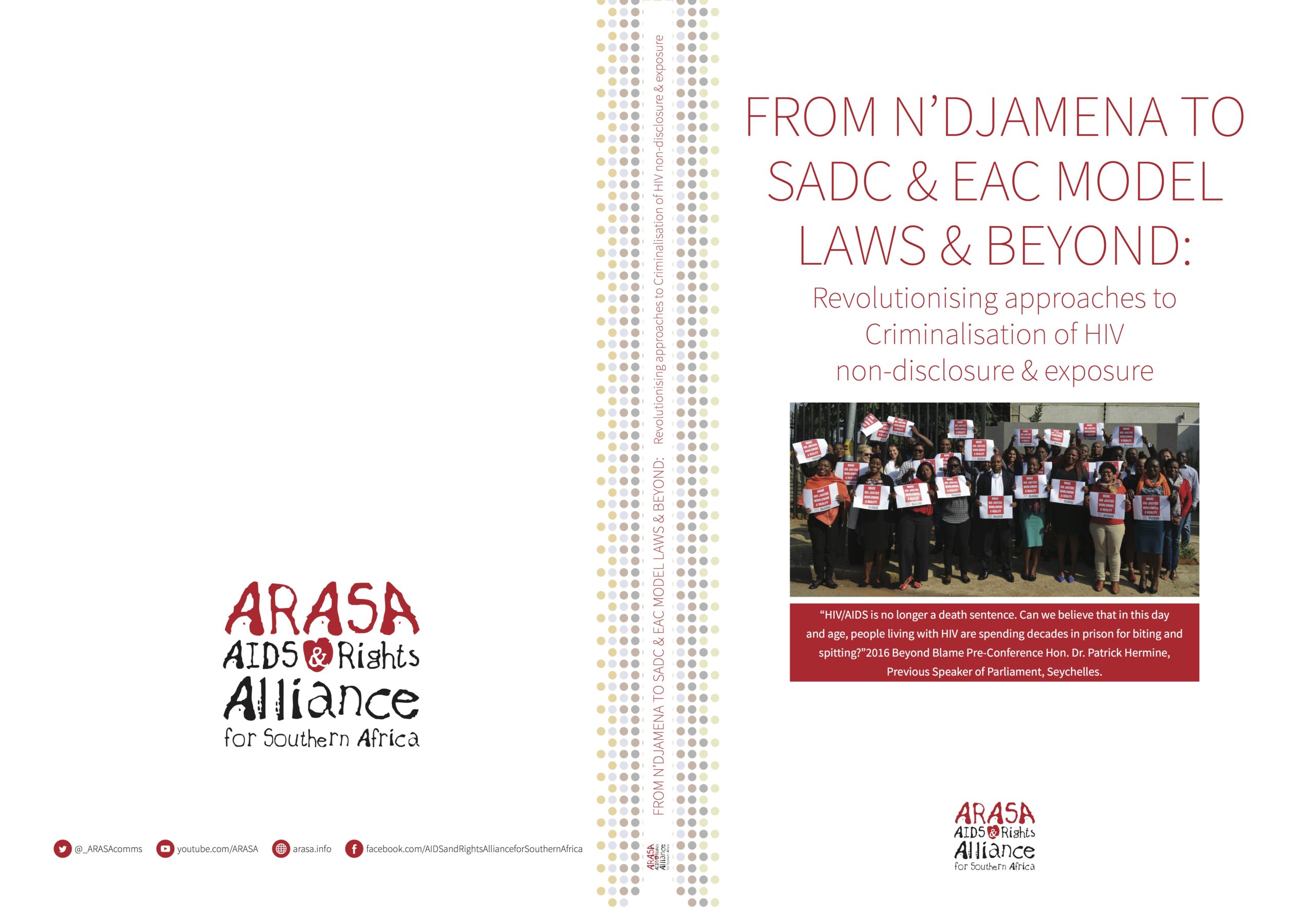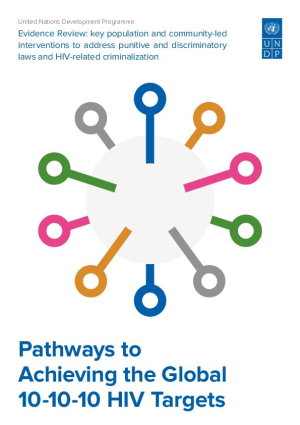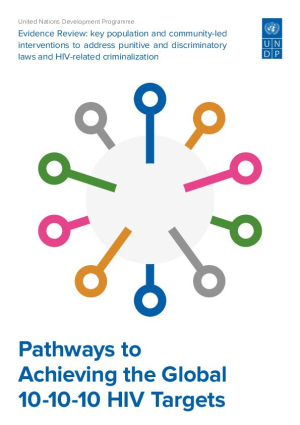This short guide from The Center for HIV Law and Policy published in 2013 provides suggested actions to further advocacy against HIV criminalisation, with associated resources.
Organising advocacy
Increasing awareness and strategizing for future advocacy
Agencies around the world are using different techniques to undertake advocacy to reduce HIV criminalisation. These resources include manuals on how anti-criminalisation can be undertaken, tools to use when developing advocacy plans, and records of advocacy events – showing advocacy development in action.
Why Are We Putting People In Jail For Having HIV? First: HIV Criminalization A Grassroots Guide To HIV Criminalization: Facts, Foolishness And Solutions
This guide developed by The Center for HIV Law and Policy and National Center for Lesbian Rights in 2015 outlines the basics of HIV criminalization, medical facts, how criminalization exacerbates stigma, issues with HIV laws, and how people can advocate for change. Includes useful links.
Results from the Roundtable on Criminalization of HIV and women in BC Priority Setting Day
Outlines the impact of the criminalization of HIV on women, and sets research and advocacy priorities to inform policy and practice.
Opening Ceremony, HIV Is Not A Crime Conference
Includes highlights from the opening ceremony of the first-ever conference on HIV criminalization in the U.S. (HIV is Not a Crime) attended by more than 170 people from 27 states.
Motivations for Punishing Someone Who Violates HIV Nondisclosure Laws: Basic Research and Policy Implications
Suggests the general public is likely to endorse HIV criminalisation as fair and credible if used to punish actions that cause considerable harm. While it may not be possible to gain public support for a sweeping elimination of HIV criminalisation laws, a realistic advocacy agenda may involve arguments for limiting statutes and prosecutions to egregious cases where considerable harm is caused.
Criminal HIV exposure laws: Moving forward
Asks whether “after more than 25 years one has to wonder if researchers and advocates might be simply ‘preaching to the choir’”. Argues that advocacy will benefit from applying more time to understanding the systems and beliefs that allow HIV criminalisation to endure.
Advocates Speak: A Snapshot of Voices and Perspectives from Grinnell
This blog post from the Center for HIV Law and Policy highlights a number of themes reflected by participants at the first HIV is Not a Crime training in Iowa, 2014.
Report on the ARASA/OSISA civil society consultative meeting on the criminalization of the wilful transmission of HIV
Outlines discussions at a community consultative meeting on HIV criminalisation attended by members of civil society from a range of countries within the Southern African Development Community (SADC). The meeting considered different perspectives on criminalisation, aiming to reach consensus on what constitutes an appropriate and effective response to harmful HIV-related behaviour.
Technical consultation in collaboration with the European AIDS Treatment Group and AIDS Action Europe on the criminalization of HIV and other sexually transmitted infections, Copenhagen, 16 October 2006
Describes the work of the 2006 WHO technical consultation on the criminalization of HIV exposure and transmission, involving participants from all over Europe. Concludes that criminalization of HIV/STI transmission or exposure should be a last resort and only undertaken in a manner consistent with human rights conventions and laws. Argues that criminalization represents a failure of prevention efforts, with greater efforts required to overcome stigma and discrimination that undermine prevention.
Interview with Iowa’s Tami Haught on Building a Broad Law Reform Coalition
Provides first-hand account of advocacy to reform Iowa's HIV criminalization statute, Iowa Code 709C.
Repealing Section 19A: How we got there
Provides first-hand account of advocacy to reform Victoria’s (Australia) Crimes Act.
HIV is not a Crime Training Academy 2016
Supports advocates to effectively strategize about ending HIV criminalisation. The 30-minute video distils the content of the three-day training academy into four overarching themes: survivors, victories, intersectionality and community.
International Consultation on the Criminalization of HIV Transmission: Summary of main issues and conclusions
Records discussions of legal experts and other stakeholders at a UNAIDS/UNDP meeting convened in the context of renewed calls for the use of criminal law to HIV sexual transmission. Discussions aimed to inform a UNAIDS/UNDP policy brief.
Criminalization of HIV Non-Disclosure in Canada Video Series
Series of 23 short videos on different aspects of criminalization of HIV non-disclosure in Canada. Topics include: What is criminalization of HIV disclosure?, What should I do if I’m charged?, Why don’t people with HIV always disclose?, and How does Canada’s strict legal stance affect those living with HIV?.
Advancing HIV Justice: A progress report of achievements and challenges in global advocacy against HIV criminalisation
Provides a progress report of achievements and challenges in global advocacy against HIV criminalisation during the 18 month period, September 2011 to March 2013.
Advancing HIV Justice 2: Building momentum in global advocacy against HIV criminalisation
Provides a progress report of achievements and challenges in global advocacy against HIV criminalisation from April 2013 to 30 September 2015.
- Alternative links
- Français (Traduction automatisée),
Unsafe law: health, rights and the legal response to HIV
Suggests that, while important, rights-based arguments are an insufficient basis for advocacy, with legal scholarship and research having an important role to play. Argues that policy-makers, legislators and those responsible for interpretation and enforcement of law must base their HIV response not on populist morality but on the strong evidence base provided by three decades of clinical, scientific and social research.
Body Politics: The Criminalisation of Sexuality and reproduction – A campaigning Toolkit
Provides concrete campaigning techniques such as mapping stakeholder participation and power, identifying advocacy targets, and building capacity
Advancing HIV Justice 3: Growing the global movement against HIV criminalisation
Provides a progress report of achievements and challenges in global advocacy against HIV criminalisation from 1st October 2015 to 31st December 2018.
Using Research In The Fight Against HIV Criminalisation – A Guide for Activists
The purpose of this guide is to help advocates who want to use research in their activism. It is not a guide about how to conduct original research. Instead, it focuses on how to find, read and interpret research on HIV criminalisation, giving examples of how advocates have successfully used research to challenge HIV criminalisation.
How to change the law
Ground-breaking research from the Human Dignity Trust offering a step-by-step analysis of how the reform of discriminatory sexual offence laws has been achieved and identifying how it can be replicated. Countains a series of reports investigating in detail how countries in four regions of the world have recently reformed outdated and discriminatory sexual offences laws.
HIV Is not a Crime – Modernize Nevada’s HIV Criminal Laws
Talking points to help activists advocating against Nevada's HIV Criminal Laws.
HPV Talking Points – Keep out of the criminal law
HPV Talking points published by the HIV Modernization Movement-Indiana to support advocacy against bill attempting to add HPV to outdated HIV or STD criminal laws (other than the specific epi/medical/testing facts unique to HPV, many of these talking points would apply to attempts to add any additional communicable diseases to these criminal laws).
Evaluation of the Global Commission on HIV and the Law
Findings from an external evaluation of the impacts and legacy of the Global Commission on HIV and the Law. It explores the fulfilment of the Commission’s objectives, taking into account the perspectives and experiences of representatives from government, including law and policy makers, civil society including those most marginalised and affected by HIV, as well as United Nations agencies and other development partners.
Use of the Expert Consensus Statement on the Science of HIV in the Context of Criminal Law
Interim scoping report that explores the impact of the Expert Consensus Statement in the two years since its publication.
Beyond Blame: Challenging HIV Criminalisation
In this special report published in 'Mujeres Adelante @ AIDS 2014', Felicita Hikuam of ARASA describes the highlights of this International AIDS Conference pre-conference (held on Sunday, 20 July 2014 in Melbourne, Australia) which focused on working to end the overly broad criminalisation of HIV non-disclosure, exposure and transmission.
When Saliva Is a Crime: Reforming Mississippi’s HIV Criminalization Law Utilizing the Center for Disease Control and Criminalization Law Utilizing the Center for Disease Control and Prevention’s Policy Analytical Framework
In this study, Mississippi’s existing policy was identified using the Center for Disease Control and Prevention’s Policy Analytical Framework, and three possible policy options were analyzed and scored based on public health impact, feasibility, and economic and budgetary impact. Results of this analysis strongly indicate that Mississippi Code ANN. § 97-27-14 should be amended to be scientifically accurate and include a criminalization clause based on the National HIV/AIDS Strategy for the United States goals and the United States Department of Justice Civil Rights Division best practices.
HIV, the Law and Human Rights in the African Human Rights System: Key Challenges and Opportunities for Rights-Based Responses
Report on the Study of the African Commission on Human and Peoples’ Rights. The report presents the current state of the HIV epidemic in Africa through a human rights and gender lens by showing the populations and locations most affected by HIV and those underserved by the response to the epidemic. It also describes the global, regional and national norms and standards relating to HIV and health, as well as their interpretation and application by African regional mechanisms, United Nations (UN) bodies and national courts and institutions. It further provides a detailed analysis of the key human rights challenges affecting the response to HIV on the continent.
- Alternative links
- Français
PRACTICAL GUIDE FOR PARALEGALS: Supporting People Living with HIV Affected by HIV Criminalization in the EECA Region
The purpose of this guide is to raise the legal awareness of activists from the community of people living with HIV who provide paralegal assistance to people affected by the criminalisation of HIV. This guide is also recommended for use by activists from key populations - people who use drugs, sex workers, and representatives of the LGBT community. This manual reflects the experience of the HIV-positive community members, as well as their partners and associates from across Eastern Europe and Central Asia (EECA), in providing direct assistance to HIV-positive people affected by discriminatory HIV-specific laws and the decriminalisation of HIV.
Overview of the webinar series on overcoming HIV-related stigma and discrimination, HIV transmission decriminalisation as well as six areas of the Global Partnership in the EECA region
The CO “100 PERCENT LIFE” and the Global Network of People living with HIV held a series of thematic webinars that brought together activists with expertise in the decriminalization of HIV transmission and representing countries from the EECA region. The first two webinars in the series aimed to provide an overview of the objectives and tools within the Global Partnership (webinar 1) and outline key human rights challenges and led to a subsequent detailed discussion of seven key programs and six areas in the work to address stigma, discrimination, and criminalization (webinar 2). The speeches of all speakers and links to their presentations are available for download in Annex 1 of this document.
Beyond Blame: Challenging HIV Criminalisation at AIDS 2016
On 17 July 2016, approximately 150 advocates, activists, researchers, and community leaders met in Durban, South Africa, for Beyond Blame: Challenging HIV Criminalisation – a full-day pre-conference meeting preceding the 21st International AIDS Conference (AIDS 2016) to discuss progress on the global effort to combat the unjust use of the criminal law against people living with HIV. Attendees at the convening hailed from at least 36 countries on six continents (Africa, Asia, Europe, North America, Oceania, and South America). This report presents an overview of key highlights and takeaways from the convening grouped by the following recurring themes: Key Strategies Advocacy Tools Partnerships and Collaborations Adopting an Intersectional Approach Avoiding Pitfalls and Unintended Consequences.
Advancing HIV justice 4: Understanding Commonalities, Seizing Opportunities
Provides a progress report of achievements and challenges in global advocacy against HIV criminalisation from 1st January 2019 to 31st December 2021.
OptTEST case study 6: Repealing bad criminal law on HIV in Denmark.
This study looks at how Denmark tackled criminalisation of transmission & exposure.
OptTEST case study 8: Criminalisation law reform in the Netherlands
This study looks at how The Netherlands tackled criminalisation of transmission & exposure.
OptTEST case study 4: Removing sex work regulations in Greece
In April 2012, the Greek police carried out a massive operation in downtown Athens, arresting drug users and sex workers, forcing them to undergo HIV testing and charging them with prostitution. This case study explores the response from human rights and HIV groups both in Greece and internationally and the following campaign to repeal the provision.
Advancing HIV Justice: Achievements and Challenges in Global Advocacy Against HIV Criminalisation – African Update (ICASA 2013)
Although North America is the continent with the most known prosecutions, 26 African countries have overly broad and/or vague HIV-specific criminal laws and another 3 are considering enacting similar laws. This analysis reviewed global efforts in five broad areas: building the global evidence base; generating persuasive social science; challenging new laws; advocating for law reform; and addressing legal processes and enforcement.
Building persuasive evidence How can the social sciences support global anti-criminalisation advocacy?
Working paper prepared for ‘HIV Prevention and the Criminal Law’ workshop, Toronto April 26-28, 2013. In order to better understand how advocates have used evidence to persuade policymakers and/or criminal justice system actors to repeal, reform and/or create improved outcomes for public health and/or human rights, leading advocates in four jurisdictions where such positive changes are taking place and/or have already occurred (Victoria, Australia; Denmark; England & Wales; and Iowa, United States) were asked to take part in a survey.
Making Change Happen: Advocacy and Citizen Participation
The Making Change Happen workshop brought together innovative activists and thinkers to reclaim advocacy and citizen participation as deep and ongoing processes of organizing, consciousness raising, political empowerment and social transformation to benefit the poor and marginalized. This report is structured around the key themes addressed during the meeting:
- Engagement in advocacy - When is a policy space strategic and when is it just window dressing?
- Issue-based struggle or struggle-based issue - Linking social transformation and policy advocacy
- Who’s who in advocacy - Identity, representation and legitimacy
- How to assess success - Evaluation for learning
Implementing and scaling up programmes to remove human rights related barriers to HIV services
This publication builds on existing global technical guidance in human rights responses, and further advances efforts to support implementers to design and deliver high quality human rights programmes that are well integrated, sustainable, and at scale. The guidance is practical and organised around the Investment Approach to HIV. It helps implementers to understand the programmatic components of evidence-informed and quality interventions to remove barriers to services.
OptTEST Tip sheet 7 – How and where do I find evidence for a change in policy?
Explores how to change existing policy by presenting clear and understandable evidence to support advocacy.
Issue Brief #1: Enabling Legal Environments, Including Decriminalization for HIV Responses
This issue brief shares lessons and reflections on enabling legal environments, including decriminalisation, to inform the implementation of key commitments in the 2021 Political Declaration on HIV and AIDS and the Global AIDS Strategy. These include a shared understanding of the harms caused by the overly broad and unjust application of criminal laws; sensitization of key stakeholders and their engagement in legal review processes; A well-informed judiciary; Coordinated, multi-pronged and multisectoral legal advocacy; and, global and regional advocacy to advance national-level changes to HIV-related punitive and discriminatory laws, including decriminalization.
8th Symposium on HIV, Law and Human Rights
The report of the HIV Legal Network's 8th HIV, Law and Human Rights Symposium held in 2019 summarizes the discussions of the Forum where survivors of HIV criminalization shared their experiences and where experts in the field presented updates on the current state of HIV criminalization in Canada, the latest scientific developments surrounding HIV transmission and the future of advocacy efforts in the country.
The Weight of Science: Decriminalizing HIV in Pennsylvania
This report highlights the issue of HIV criminalization in Pennsylvania, where individuals living with HIV have been prosecuted under existing criminal laws solely due to their HIV status. The report emphasizes that following the evidence-based science and moving away from fear-based approaches will be essential in addressing HIV criminalization, ending stigma and discrimination, and ultimately halting the HIV epidemic.
“‘A woman came to us, she asked for help with the legal process’” – Interview with Evgenia Korotkova
Interview exploring how an activist living with HIV went from a public defender in cases under Article 113 of the Criminal Code to a community expert who, after speaking at a feminist forum, is influencing the humanisation of legislation on people living with HIV in Uzbekistan. Svetlana Moroz’s interview with Yevgeniya Korotkova on the significant reduction of the list of prohibited professions for people living with HIV in Uzbekistan.
A gender-centred dialogue on alternative justice responses to HIV non-disclosure criminalization
This report represents a synthesis of cross-sector discussions during a roundtable about alternative justice responses to the criminalization of HIV non-disclosure in Canada, as well as findings from the research and previous community engagement.
- Alternative links
- Français
HIV Criminalisation and Young People
In November 2022, the Global Network of Young People Living with HIV (Y+ Global) convened an online dialogue to explore how criminalising HIV non-disclosure, potential or perceived exposure, or unintentional transmission affects young people living with HIV, young sex workers, young people who use drugs, and young LGBTIQ+ persons. The participants were all from networks representing these groups of young people from Africa, Asia, Europe and Latin America and globally. Youth-led HIV and key population networks can strengthen and contribute to the HIV decriminalisation movement by building on existing work, working together, and advocating at different levels.
From N’Djamena to SADC & EAC Model Laws and Beyond: Revolutionising approaches to Criminalisation of HIV non-disclosure & exposure
ARASA in collaboration with the HIV Justice Worldwide (HJWW) Consortium, convened a two-day meeting involving policy and law makers, members of the judiciary, lawyers, parliamentarians and representatives from civil society organisations from the East African, SADC regions and global North to revisit alternative approaches towards criminalisation and to accelerate a sustained momentum, strengthen collective action.
Bringing Science to Justice: Impact of the Expert Consensus Statement on the Science of HIV in the context of criminal law over the past five years (Poster)
Research findings on the five-year impact of the ‘Expert Consensus Statement on the Science of HIV in the Context of Criminal Law’, presented at the International AIDS Conference (IAS 2023). The research examined the impact of the Expert Consensus Statement on individual cases as well as broader law and policy outcomes in the five years since its publication and found that the statement remains relevant, accurate and extremely useful. Newer studies bolster the conclusions presented in the statement, reinforcing its overarching message that science does not support HIV criminalisation.
The Expert Consensus Statement on the Science of HIV in the Context of Criminal Law – Five-year Impact Report: Bringing Science to Justice
In 2018, twenty leading HIV scientists published the ‘Expert Consensus Statement on the Science of HIV in the Context of Criminal Law’ (Expert Consensus Statement) to address the misuse of HIV science in punitive laws and prosecutions against people living with HIV for acts related to sexual activity, biting or spitting. The process involved undertaking detailed analysis of the best available scientific and medical research data on HIV transmission, treatment effectiveness and forensics. Building on an initial scoping report published in 2020, the HIV Justice Network (HJN) undertook further research between April and July 2023 examining the impact of the Expert Consensus Statement in cases and advocacy in the five years since its publication.
Evidence Review: key population and community-led interventions to address punitive and discriminatory laws and HIV-related criminalization
Pathways to Achieving the Global 10-10-10 HIV Targets. This evidence review canvasses the peer-reviewed and grey literature published from January 2018 to December 2022 to identify tactics, strategies, and approaches that have been used to remove or mitigate the impact of discriminatory and punitive laws or policies. This evidence review is particularly focused on initiatives that were led by key populations and people living with HIV.
Pathways to Achieving the Global 10-10-10 HIV Targets
This review focuses on initiatives led by key populations and people living with HIV documented in peer reviewed and grey literature published between January 2018 and December 2022. To assist in meeting the 10-10-10 targets, the review highlights 14 specific tactics, strategies and approaches that have been used to reform or mitigate the impact of punitive and discriminatory laws and policies and HIV-related criminalisation on access to services for people living with HIV and other key populations. This review serves as a tool for all stakeholders, including civil society, communities of people living with and affected by HIV and other key populations, development partners, government officials and donors to identify relevant and linked avenues to pursue in legal and policy reform for achieving the 10-10-10 targets of the 2021 Political Declaration on HIV and AIDS.

